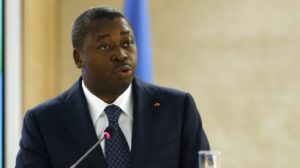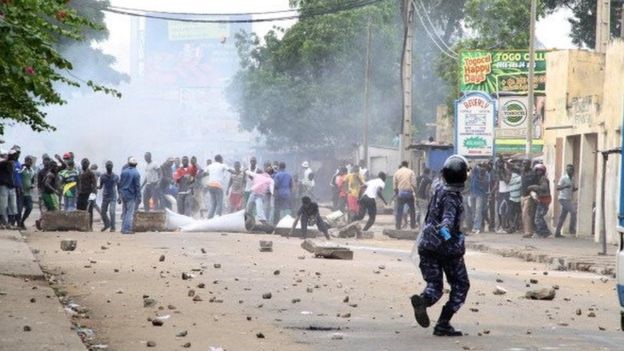
Lome, Togo//-Togo has plunged into unrest as citizens take to the streets protesting President Faure Gnassingbé’s controversial constitutional amendments, which aim to cement his power indefinitely.
The proposed changes, which would strip citizens of their voting rights for presidential elections, have ignited widespread demonstrations, leading to violent clashes with police and military forces.
As calls for justice grow louder, Togolese citizens demand an end to brutality and the restoration of democratic freedoms.
The tensions erupted across the country as thousands of Togolese citizens gathered in various cities, expressing their outrage over President Faure’s intentions to amend the constitution, effectively establishing a presidential tenure without electoral accountability.
For many, this move represents a blatant disregard for democratic principles, echoing a long-standing fear that the Gnassingbé family, which has ruled Togo for over five decades, is intent on perpetuating its grip on power.
Background of the Crisis
Togo has been a republic since gaining independence from France in 1960. The country’s founding years were marked by successive coup d’états, ultimately resulting in Eyadema Gnassingbé taking over in 1967 and hanging onto power until he died in 2005.
Single-party rule and a personality cult for the leader marked that era. His son Faure succeeded him to the presidency with the staunch support of the military and repeated claims of election rigging.

Ulf Laessing of the German Konrad Adenauer Foundation (KAS) stated, “Presidential elections scheduled for this year were cancelled last year in favour of constitutional changes that allow Gnassingbé to remain in power indefinitely.”
He added that although the leader has crafted an image of demoting himself to “essentially a prime minister,” he has consolidated more power in his new position as President of the Council of Ministers.
For over two decades, President Faure Gnassingbé has maintained power through elections that many opposition groups and citizens consider flawed and unrepresentative.
The proposed constitutional changes eliminate the existing electoral process for selecting leadership, removing any possibility for citizens to participate in voting for their president.
Such a move represents a significant departure from democratic principles and undermines the foundational reforms introduced after previous unrest in the country.
Frameworks of political oppression have been highlighted by human rights organisations, with reports of excessive force used by security personnel against peaceful protesters.

Eyewitness accounts described scenes of chaos, with tear gas and rubber bullets deployed to disperse crowds demanding dignity and justice.
This political crisis contravenes multiple regional and international frameworks dedicated to upholding democratic governance and human rights.
The African Charter on Human and Peoples’ Rights, to which Togo is a signatory, emphasises the importance of free and fair elections and respect for constitutional order, condemning unconstitutional changes of government. The United Nations Universal Declaration of Human Rights also affirms citizens’ right to participate in government and to express dissent peacefully.
The proposed constitutional amendments are viewed as violations of these fundamental rights, threatening the democratic fabric of Togo and breaching commitments under these frameworks.
The brutality faced by demonstrators has drawn international condemnation, urging the Togolese government to respect the rights of its citizens to peacefully assemble and voice their grievances.
However, the effects of these protests are far-reaching. Economically, the unrest has disrupted businesses and local markets, adding to the already challenging living conditions for many Togolese families.
Furthermore, the fear of violence has created a climate of anxiety, with citizens uncertain of what tomorrow holds. The potential for further escalation remains high as the government continues to respond with force rather than dialogue.
In light of the unfolding crisis, activists and citizens alike are calling for justice and accountability. They demand the immediate cessation of violence and the restoration of democratic processes, including the right to vote.
The international community is being urged to take a stand, applying pressure on the Togolese government to engage in meaningful reforms that prioritise the voices of the people.
The “Hands Off My Constitution” Opposition leaders in Togo have called for additional protests in the coming days to oppose what they describe as a “constitutional coup.”
As Togo stands at a crossroads, the resilience of its citizens shines through their unwavering determination to fight for a future that embraces democracy, justice, and human rights.
The world watches closely, hopeful that President Faure Gnassingbé will heed the call for change and honour the fundamental rights of its people.
By Godwin Dzigbanu, African Eye Report


